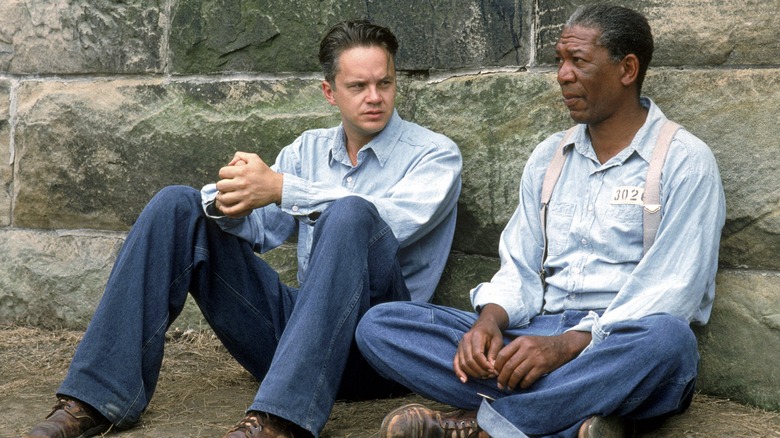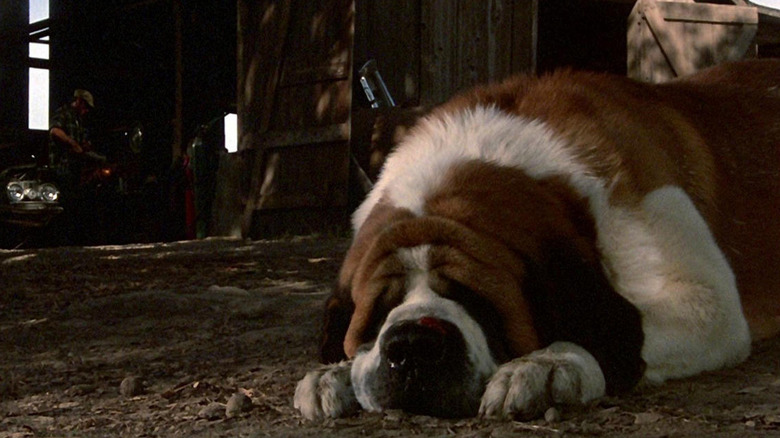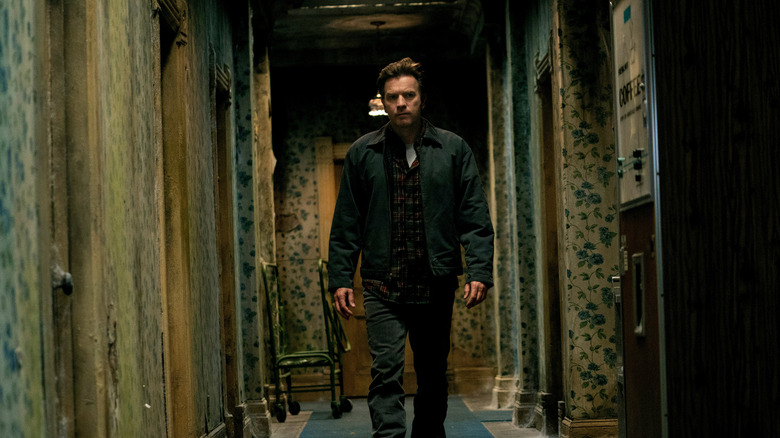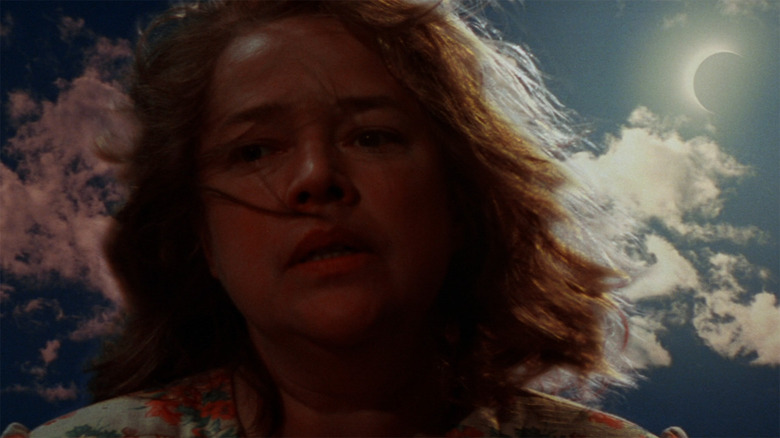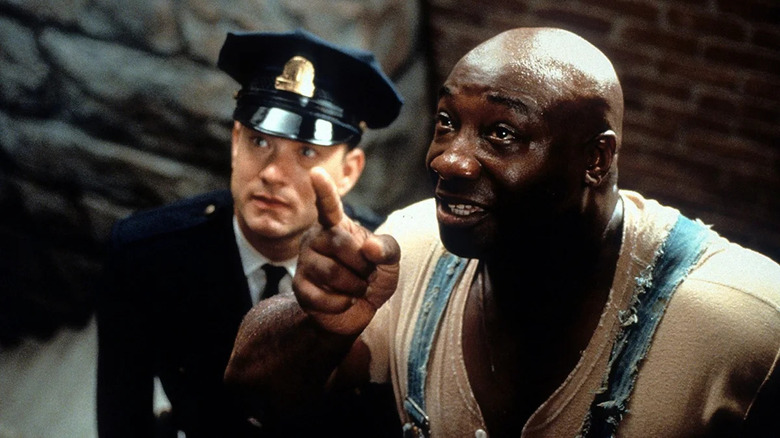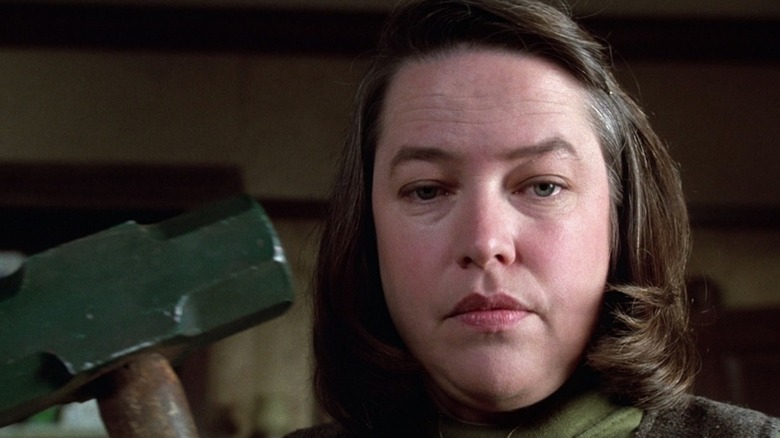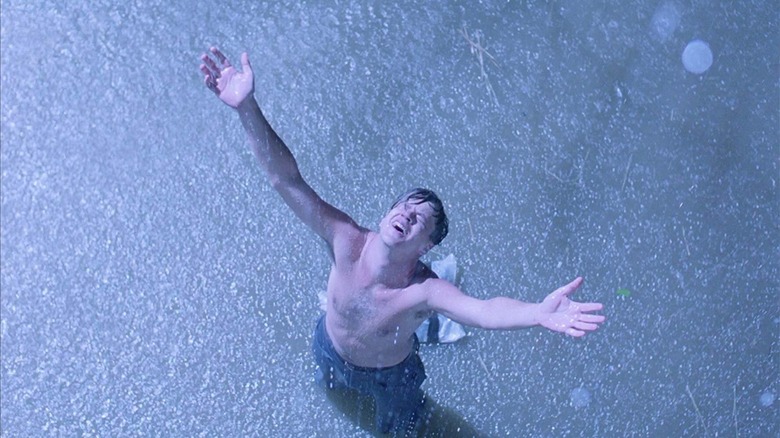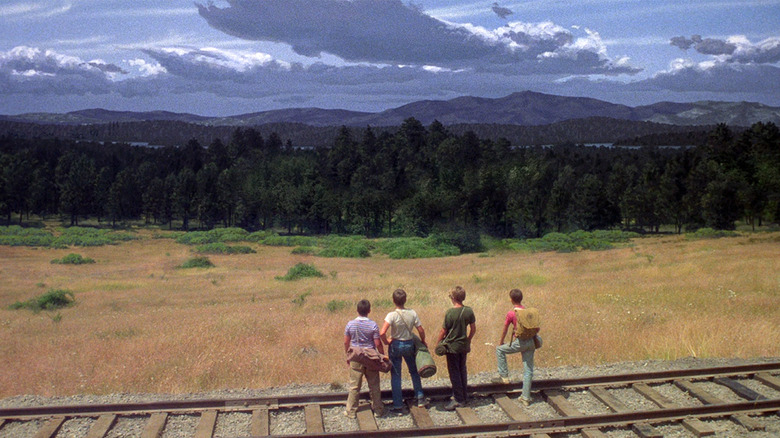The 7 Best Stephen King Movies, According To Stephen King
There have been Stephen King movies almost as long as there have been Stephen King books. King's first novel "Carrie" hit bookshelves in 1974, and by 1976, a film adaptation from director Brian De Palma was in theaters. While there are a few outliers, the vast majority of King's novels and a good chunk of his short stories have been adapted to the screen. And over the years, folks have asked King to comment on his favorites. The titles seem to change from time to time, but in 2014, King sat down for an all-encompassing interview with Rolling Stone, and during the course of the interview, he was asked to name the "best movie ever made" from one of his books. In turn, King provided a brief list of what he considers to be his favorite movie adaptations. A few years later, he added one more title to that list. So here are the best Stephen King movies, according to Stephen King himself. Surprisingly, not one of the 67 "Children of the Corn" movies made the list!
Cujo
Released in 1983, "Cujo" is an adaptation of King's 1981 novel of the same name (side-note: in King's non-fiction book "On Writing," he admits that he was drinking so heavily during the time period he penned "Cujo" that he "barely remembers writing at all"). Inspired by an actual incident, "Cujo" tells the story of a St. Bernard that goes rabid and starts terrorizing people. A large portion of the film finds a mother (Dee Wallace) and her young (Danny Pintauro) trapped in a dead car on a sweltering hot day as the killer dog lurks outside like the shark from "Jaws."
It's a pulpy, low-budget movie, but King thinks it really did the trick. "'Cujo' is terrific," he told Rolling Stone. In the book "Stephen King at the Movies" by Jessie Horsting, King elaborates further, stating, "It has no finesse, it has no pretensions; I thought Dee Wallace should have been nominated for an Academy Award." (It's also worth noting that in the "Stephen King at the Movies" book, which was published in 1986, King lists "Cujo" as his "favorite adaptation of all the movies," although that opinion has apparently changed to a different movie now, which we'll get to eventually.)
Doctor Sleep
While many hold Stanley Kubrick's adaptation of "The Shining" in high regard, Stephen King, rather famously, hates it. King has listed various reasons for his dislike of the Kubrick film over the years, and there's no need to rehash them (you can read more about that right here). King would go on to pen a sequel to "The Shining" called "Doctor Sleep," published in 2013. The novel is, of course, a sequel to King's "The Shining" book, not Kubrick's adaptation. So when Mike Flanagan got around to making "Doctor Sleep" into a movie, he was faced with a unique problem: would he remain true to King's book, or would he acknowledge Kubrick's pretty famous movie?
Flanagan actually found a way to do both — the film remains fairly true to King's "Doctor Sleep" novel while also acknowledging, and sometimes even recreating moments from Kubrick's film. This could've gone very, very wrong — but Flanagan actually makes it work. In fact, even Stephen King was impressed. "I don't want to get into a big argument about how great the 'Shining' film is that Kubrick did or my feelings about it," King told EW. "All I can say is, Mike took my material, he created a terrific story, people who have seen this movie flip for it, and I flipped for it, too. Because he managed to take my novel of 'Doctor Sleep,' the sequel, and somehow weld it seamlessly to the Kubrick version of 'The Shining,' the movie. So, yeah, I liked it a lot."
Dolores Claiborne
In my humble opinion, "Dolores Claiborne" might be the most underrated Stephen King movie of all time. Seriously, when was the last time you heard anyone talk about this movie? And yet, despite it's almost non-existent reputation, it's fantastic! Directed by Taylor Hackford, "Dolores Claiborne" stars Kathy Bates as a New England woman accused of murdering her elderly employer. As we learn, this isn't the first time Dolores was suspected of murder — in the 1970s, Dolores' abusive husband (David Strathairn) died under mysterious circumstances, with all eyes on Dolores as the prime suspect.
"Dolores Claiborne" has plenty of real-world horrors, but it isn't a straightforward horror movie; it's a character drama, featuring a tight script (courtesy of "Michael Clayton" filmmaker Tony Gilroy) and host of fantastic performances — Bates and Strathairn are fantastic, as is Jennifer Jason Leigh, playing Dolores' troubled daughter, Judy Parfitt, playing Dolores' recently deceased boss, and Christopher Plummer, who portrays a local cop determined to put Dolores away. Throw in a haunting score from Danny Elfman and you have one of the very best King movies. As King himself told Rolling Stone, "'Dolores Claiborne' is a really, really good film."
The Green Mile
In 1996, Stephen King tried something new (for him): publishing a novel in serialized form. "The Green Mile" was published in six installments between March and August of that year, and sure enough, Hollywood eventually came calling. Frank Darabont, who has directed more than one King film, helmed the movie adaptation, which opened in 1999. The movie stars Tom Hanks as a prison guard working death row in the 1930s. When hulking John Coffey (Michael Clarke Duncan) arrives on death row, Hanks' character and his fellow guards soon learn the childlike giant has magical powers. On top of that, he's innocent of the murders he's been convicted of.
"The Green Mile" is pretty darn good overall, although it relies very heavily on a tired trope. It's also not the best Frank Darabont prison-set Stephen King movie on this list (we'll get to that momentarily). In the book "Hollywood's Stephen King" by Tony Magistrale, King states: "I would have to say that I was delighted with 'The Green Mile' [...] For a story that is set on death row, it has a really feel-good, praise-the-human condition sentiment to it. I certainly don't have a problem with that because I am a sentimentalist at heart."
Misery
"Misery" has the distinction of being the only Stephen King movie to win an Oscar — star Kathy Bates took home the Best Actress award for playing the deranged Annie Wilkes. Featuring a script by William Goldman, one of the best screenwriters of all time, Rob Reiner's "Misery" is based on King's novel about a romance novelist who gets held hostage by a woman who claims to be his number-one fan. King's book is great, but I dare say that Goldman's script is even better — it's tighter, and a bit more clever. It also changes a pretty big detail: in the book, Annie cuts off the foot of captured writer Paul Sheldon with an axe. In Goldman's script and Reiner's film, Annie instead smashes Paul's ankles with a sledgehammer. It's somehow more brutal and more visually memorable than simply chopping off Paul's foot. "'Misery' is a great film," King told Rolling Stone.
The Shawshank Redemption
Released in 1994, Frank Darabont's "The Shawshank Redemption" was not a big hit. However, VHS sales and constant TV reruns helped turn it into one of the most popular Stephen King movies of all time. As a result of this, there's been a bit of a backlash against the pic, with some shrugging it off as little more than a "dad movie." But you know what? "The Shawshank Redemption" holds up — it's a stirring, emotional drama, and you just can't beat that Thomas Newman score. Tim Robbins plays a man (wrongly) convicted of killing his wife and her lover. In the 1940s, after being handed two consecutive life sentences, he gets sent to the brutal Shawshank State Prison. The film then spans several decades, showing Andy as he grows close to fellow inmate Red (Morgan Freeman), and eventually escaping prison in an unlikely fashion. "When I first saw it, I realized he'd made not just one of the best movies ever done from my work, but a potential movie classic," King once said of "Shawshank."
Stand By Me
So, what's the very best Stephen King movie? According to Stephen King, at least in that 2014 Rolling Stone interview, it's Rob Reiner's "Stand By Me," adapted from King's novella "The Body." King has even gone on record saying the film made him emotional when he first saw it. "I thought it was true to the book, and because it had the emotional gradient of the story. It was moving," King said. "When the movie was over, I hugged [Rob Reiner] because I was moved to tears, because it was so autobiographical."
Like more than one film on this list, "Stand By Me" is not a horror movie. Instead, it's a coming-of-age drama about four young friends (Wil Wheaton, River Phoenix, Corey Feldman, and Jerry O'Connell) who set out to find the dead body of a kid hit by a train, believing that discovering the corpse and reporting it to authorities will make them local heroes. It's a sweet, touching, funny movie. In a documentary included on the home media release of "Stand By Me," King is even quoted as saying that the movie is the "first completely successful adaptation" of one of his works.
